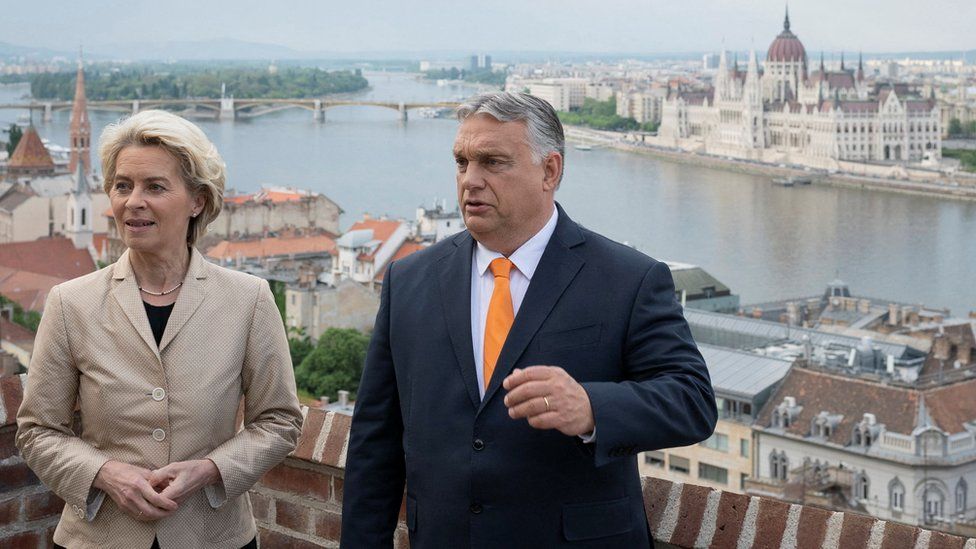EU's awkward summit: Don't mention Russian oil ban
- Published

EU leaders meet on Monday for an extraordinary summit, but as one diplomat put it: "What are we going to talk about?"
There are serious issues on the agenda, centred around the war in Ukraine. But it's doubtful the major, unresolved matter will specifically be up for discussion.
That is the EU's beleaguered attempts to ban imports of Russian oil.
It's now nearly a month since European Commission President Ursula von der Leyen announced her proposals.
"This will be a complete import ban on all Russian oil, seaborne and pipeline, crude and refined," she told the European Parliament.
Watch: EU ban on Russian oil will not be easy, says von der Leyen
It was to be an "orderly" transition, phasing out Russian crude within six months and refined products by the end of 2022.
But resistance, notably from Hungary, has held up the EU's troubled sixth package of sanctions.
Other landlocked countries, such as Slovakia and the Czech Republic, have also asked for more time due to their dependence on Russian oil. Bulgaria, already cut off from Russian gas by Gazprom, has likewise sought opt-outs.
But Prime Minister Viktor Orban's Hungarian government, which has compared an oil ban to dropping a nuclear bomb on its economy, is seen as the ultimate obstacle. He wrote to the European Council to say he didn't even want to discuss it next week.
'Blood money'
Diplomats are getting frustrated but they also concede that, with soaring energy prices, some countries may not be entirely unhappy that a decision is being blocked.
More hard-line nations are clear that Europe must stop handing Russia billions in what they see as "blood money".
However, there's also a feeling that Ursula von der Leyen has mishandled things, announcing plans before doing the necessary groundwork.
Nevertheless, both she and the head of the European Council this week suggested a deal on oil might happen within days.
That was "absolutely bonkers", remarked one EU diplomat: "Charles Michel is setting his own European Council up for failure."
Little time is left with leaders gathering in Brussels on Monday.
Ukrainian President Volodymyr Zelensky has voiced his anger at the delays: "Of course, I am grateful to our friends who are promoting new sanctions," he said in Thursday's late night address.
"But where did those who block the sixth package get so much power? Why are they still allowed to have so much power, including in intra-European procedures?"
'Avoiding debate not realistic'
While sanctions are signed off at ambassador level, rather than at big EU summits, there had been hopes that the European Council might focus minds and force the issue.
The extraordinary council was originally called, in part, because the pre-scheduled June summit felt a long way away, in the midst of a war on European soil. But items actually on the agenda, say diplomats, are principally things that are already bubbling along without the need for a major meeting.
Officially up for discussion are financial support for Ukraine, food security, defence procurement and broader issues on the EU's energy transition.
Draft conclusions, seen by the BBC, do refer to the phase-out of Russian fossil fuels while glossing over the specific issue of oil sanctions.
"Avoiding a debate is not very realistic," suggested one senior diplomat.
The odds are that someone will bring it up: elephants in the room have ways of making themselves heard. The question is whether a debate turns into a bust-up.
There is frustration that this delay is preventing other measures from going forward, given that the sixth sanctions package isn't just about oil.
It also proposes expanding export controls and the list of individuals subject to asset freezes, as well as targeting Russia's majority state-owned Sberbank.
Angling for more cash?
Member states quickly signed off the other sanctions packages, including a phased embargo on Russian coal.
Officials had talked proudly about how the EU had defied the old narratives about sluggish, tortured EU decision-making. And they had, until now.
But in his letter this week the Hungarian leader warned Charles Michel that discussing the oil embargo would "only highlight our internal divisions". Phasing out Russian oil, he argued, would require "a complete rearrangement of our refinery capacities".
In other words, it's going to cost a lot of money, which has made some suspicious that Mr Orban is ultimately angling for more cash.
European Parliament President Roberta Metsola is optimistic that Hungary is essentially adopting a "negotiating stance".
However, funds recently earmarked to help with the EU's energy transition come from a pot of money that Hungary does not yet have access to.
It's all part of a financial tug-of-war between Brussels and Budapest, over accusations that the Orban government is presiding over an erosion of democratic standards.
His supporters argue Hungary is maligned for forging its own path and quite justified in resisting a ruinous oil ban without sufficient guarantees.
Various ideas have been floated, such as putting price caps or tariffs on Russian oil to squeeze the Kremlin's revenues. Another recent proposal was cutting seaborne supplies first and leaving pipelines until later.
But while it is widely accepted that some countries will need more time and support, each compromise brings its complications.
EU ambassadors gather for a preparatory meeting on the eve of the summit. Most think this troubled sanctions package will get over the line at some point but this has been an embarrassing episode for the European Commission.
How far it will have to water it down will dictate any further level of embarrassment.
War in Ukraine: More coverage
- ON THE GROUND: The border city where Nato and the EU meet Russia
- UKRAINE: Can Ukraine help feed the world, despite the war?
- RUSSIA: Diplomat quits over Putin's 'witless' war
- READ MORE: Full coverage of the crisis
- Published18 May 2022
- Published26 January 2023
- Published4 May 2022
- Published4 April 2022